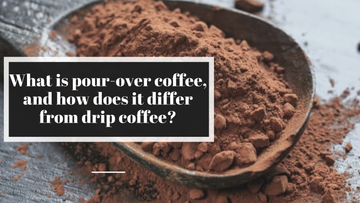How Long Do Coffee Beans Last? Storage Tips for Freshness

You are not alone if you think that stocking up on coffee beans for months is a great idea. Indeed, being a coffee lover, this could be one of the best options we can come up with. The bliss of your favorite coffee beans never runs out, but this is when you might have to think again. But why's that?
Over time, the extra coffee beans in your kitchen’s cupboards can lose their freshness and even get spoiled. If you will never appreciate less flavor and aroma in your coffee cup, then fresh coffee beans are always non-negotiable.
Let’s examine the factors that affect how much coffee beans last and the signs of stale coffee beans you should avoid.
Factors Affecting Coffee Bean Freshness

Your coffee beans might be to blame for the bland taste of your fresh coffee cup. Even the best coffee beans in the world can fall flat if they are not fresh, giving a dull taste. Let us learn more about factors that affect coffee beans’ freshness, which will further help you understand how to store coffee beans.
Roast Level and Its Impact on Freshness
First things first, let’s talk about types of coffee roast levels. Your coffee beans undergo significant transformations in the roasting process, and the roast level can change how long they stay fresh. Yes, that perfect cup you’re brewing depends on this.
Light Roasts
These beans retain their original flavors and aromatic compounds. This makes them more susceptible to oxidization, meaning they have a much shorter freshness window, typically peaking within two weeks after getting roasted. The shelf life of coffee beans is especially shorter for this roast level.
Medium Roasts
How long can coffee beans stay fresh? Medium roasts perfectly balance flavor complexity and stability, offering a moderate coffee bean shelf life. This roast is known to maintain its delightful taste for about three weeks after roasting. Medium roasts might be a safer choice for those wondering how long coffee beans are good for.
Dark Roasts
Does coffee go bad over time? Dark roasts are much more resilient to staleness. Their intense flavors can be in a great taste profile for up to a month, but it should not be assumed that they can lose their subtle nuances over time. For fresh roasted coffee, dark roasts can offer a longer freshness duration.
How Bean Origin and Processing Methods Impact Freshness
As we have now covered different roast levels of coffee beans, we should also be well-informed about where our beans originate from. How they are processed can significantly impact the freshness of your coffee cup!
Origin Matters
Coffee beans from around the globe have very distinct flavors, some lasting longer than others. Beans from Ethiopia are bright, with fruity notes that pop. However, they fall short when compared to Indonesian coffee beans, which tend to be more earthy with a robust profile. Location does matter when we talk about the quality of the bag of coffee.
Processing Methods
This one is sure to be a big deal. Coffee beans are so versatile that they can be processed in multiple ways (washed, natural, or honeyed), affecting the coffee beans’ shelf life.
Also Read: How long can coffee sit out?
Signs of Stale Coffee Beans You Should Look Out For

Do coffee beans expire? There are days when we have sipped our morning brew and felt something was off. Well, we will not be leaving you up to your feelings and will be providing you with how you can spot the signs of stale coffee beans before they ruin your morning:
Changes in the color
If your coffee beans appear dull or have a uniform brownish tint, then that’s a red flag. Over time, exposure to air and light can cause the beans to lose their features. Light exposure and coffee freshness are closely linked, so avoid keeping them in direct light.
Oiliness
Do coffee beans go stale? As these roasted beans naturally age, their oils evaporate, leaving a dry, matte surface. Conversely, an overly oily appearance, especially in dark roasts, can indicate a much more prolonged exposure to oxygen, often leading to rancidity. This could lead to a stale coffee taste and smell. Freezing coffee beans for freshness can make a significant difference here, as freezing coffee beans generally help to conserve their natural oils.
Texture of the Surface
Try running your fingers through the beans. If they feel dry, rough, and even chalky in texture, you have some coffee grounds in the process. This can be a much more prominent sign of stale coffee beans.
Also Read: How to Make Instant Coffee from Ground Coffee at Home
Conclusion
So there you have it - freshness is the secret ingredient you might have missed adding to your cup of coffee. Understanding several factors that influence the longevity of the bean and being aware of the signs of stale coffee beans early on can ensure that your brew is delightful in every sip.
Remember that the best way to keep coffee beans fresh is to purchase the coffee beans in small quantities and consume them in a reasonable time.
If you want to explore the world of coffee, visit Brew the Blend. Not only do we provide the latest information for coffee lovers, but we also provide different specialty-grade coffees, unique roasts, and curated collections.
FAQs
1. Do Coffee Beans Expire?
Yes, coffee beans expire. They can begin to lose their freshness and flavor over time.
2. How Can You Tell If Coffee Is Bad?
You can tell if coffee is bad by checking for dull color, a lack of aroma in the coffee cup, a dry or chalky texture, or excessive oiliness, indicating rancidity.
3. Can You Drink 2-Year-Old Coffee?
You can drink 2-year-old coffee if it has been stored in an airtight container for coffee beans, but it will lack freshness, flavor, and aroma, leading to a taste your tastebuds won’t appreciate.
4. Can You Use 10-Year-Old Coffee Beans?
Technically, you can use 10-year-old coffee beans if stored well, but they will taste stale and lack desirable flavor qualities. It doesn’t matter if they are coffee beans in a bag or otherwise. While you can physically brew coffee from 20-year-old beans, the quality will be highly degraded, and the taste will be unpleasant.
Also Read: What kind of roast is Brazilian coffee





